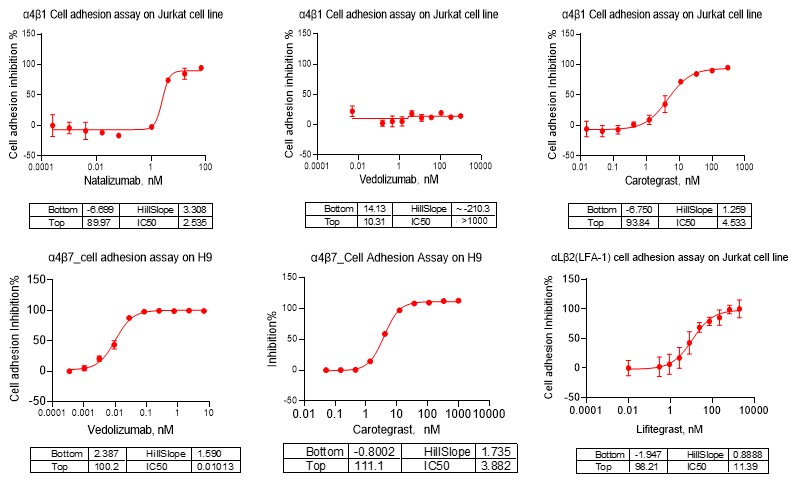Our Cell Adhesion Assay Services are designed to evaluate the adhesion properties of cells, particularly focusing on integrin-ligand interactions, which play a crucial role in many physiological and pathological processes, including immune responses, cancer metastasis, and tissue repair. These assays provide valuable insights into cell adhesion mechanisms and how they are regulated, making them applicable across both immunology and general cell biology research.
Fluorescence Polarization (FP) and ELISA: We offer two biochemical methods to assess integrin activity. Using FP, we measure the binding affinity of integrins to ligands in solution, providing quantitative insights into integrin-ligand interactions. Additionally, our ELISA-based integrin assays detect the binding of integrins to their ligands on a plate-bound format, allowing for high-throughput and sensitive analysis.

Integrin-Ligand Binding: In this approach, cells expressing integrins are seeded onto plates coated with specific ligands. After a binding period, unbound cells are washed away, leaving only those that have adhered to the ligands via integrin interactions.
Quantification via CellTiter-Glo: To quantify the number of adhered cells, we utilize the CellTiter-Glo (CTG) luminescence assay, which measures cellular ATP as an indicator of viable, adherent cells. This provides a sensitive and accurate quantification of cell adhesion, allowing us to assess how different factors or treatments affect integrin-mediated adhesion.

The cell adhesion inhibition assay measures the ability of compounds to block the binding of integrins (on T cells) to their ligands, preventing cell adhesion. Integrins are transmembrane proteins that mediate the attachment of cells to the extracellular matrix (ECM) or other cells. In the context of immune cells like Jurkat (a T cell line) and H9 (a lymphoblast cell line), integrins such as α4β1, α4β7, and αLβ2 play critical roles in immune cell migration, homing, and tissue infiltration. Blocking these integrins can inhibit the immune response, which is valuable in treating autoimmune diseases, inflammatory conditions, and preventing immune cell migration to unwanted tissues.
We value your inquiries and are here to provide you with tailored solutions for your drug discovery and development needs. Whether you have questions, require more information, or are interested in discussing potential collaborations, our team of experts is just a message away.
Feel free to reach out to us.